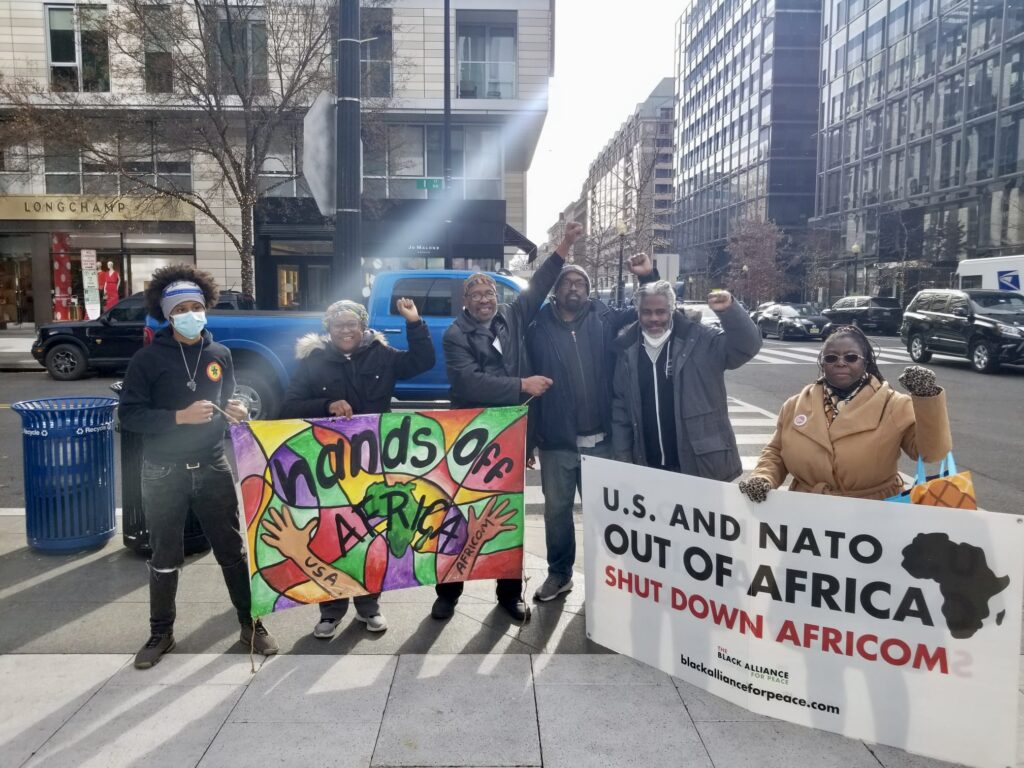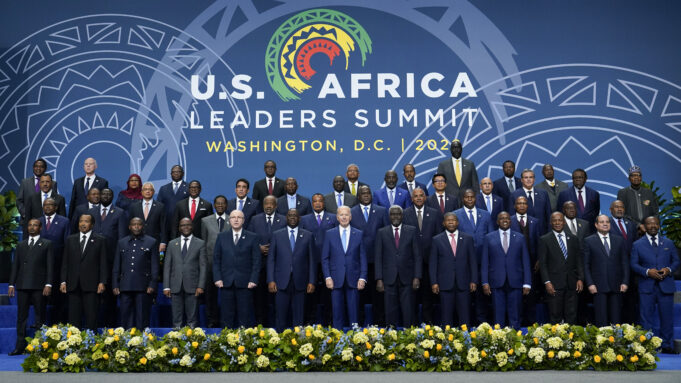America’s overtures to African leaders and heads of state are insincere and are merely more tricknology, imperialism, and window dressing wrapped in lofty vows. This is what some critics and observers of the recent U.S.-Africa Leaders Summit are warning upon the conclusion of the Washington, D.C., gathering.
Three days of wide-ranging meetings, pledges, deals, and forums on health partnerships, conservation, and climate, as well as talks on “peace, security and governance” were held Dec. 13-15. The summit hosted 49 heads of state, civil service, business, and private sector leaders at the invitation of the Biden Administration.
The gathering comes as world powers vie for control and influence of Africa. America—the foremost economic and military power—wooed African presidents with ornate promises and commitments. However, activists and observers raised concerns about the true motives behind the political, economic, and military relationships the summit was designed to foster.
Summit outcomes included President Joe Biden pledging $55 billion over three years for economic, health and security funding, and support for the African Union (AU) having a permanent seat at the G-20 grouping of nations. African leaders had long advocated for a permanent seat at the table of the United Nations Security Council, but that did not happen.
Addressing presidents at the summit’s closing session, Dec. 15, Mr. Biden said America is “all in with Africa” and looking to increase collaboration.

“African voices, African leadership, African innovation all are critical to addressing the most pressing global challenges and to realizing the vision we all share: a world that is free, a world that is open, prosperous, and secure,” said Mr. Biden.
“Africa belongs at the table in every room,” he said. “In every room where global challenges are being discussed and in every institution where discussions are taking place.”
Mr. Biden said his promises and deals at the summit are “clear proof” of the U.S. commitment to Africa.
However, some observers warn against African countries getting entangled in America’s promises. Some demand “hands off Africa” in the way America has its “hands in Africa” because in U.S. geopolitics, usually things are what they are, not always what they seem.
“We always have to look at how the U.S. engages with Africa, from a historic lens (and) a structural lens,” said Emira Woods, executive director of Green Leadership Trust, a network of Black, Brown, and Indigenous people on boards of environmental organizations and philanthropists.
America, like Europe, are industrialized because of resources that flow from Africa. “So, we have had, quite literally, centuries of the resources … flowing outside the continent in the interest of others,” Ms. Woods told The Final Call. “And more recently … other players that are added to that,” she said.
There is intensified scrambling for Africa’s extractive resources that include China, the European Union, Russia, and a growing list of other nations
“And in each instance,” added Ms. Woods, “it is the people on whose land those resources lie … (who are) made invisible.”
Another area of concern coming out of the summit was the issue of climate injustice. Part of the problem is the administration is looking at bilateral deals and business, without looking at the continent as a whole, said Ms. Woods. The summit co-sponsors were the U.S. Chamber of Commerce and the Corporate Council of Africa. The major emphasis was on closing deals.
It ends up ofttimes creating space for American companies engaged in oil, gas, and mining in the extractive industries. “Fossil fuel-driven activity that we know harms Africa disproportionately,” said Ms. Woods.
Climate injustice caused by industrialized nations and their companies is taking its toll on the continent through increasing floods, drought and devasting domino effects. Recently, Central, Southern and West Africa saw particular disasters become multipliers of misery upending people’s lives and killing hundreds. But, neither America nor Europe responds to the environmental crisis, although they are the leading culprits behind Africa’s crisis.
Ms. Woods, who is also an ambassador for “Africans Rising for Peace and Justice,” believes as the global economy becomes more unequal, it opens the door to reinforcing structural racism. She noted that Black, Brown, and Indigenous people are 70 percent of the global population and are “gifted by the Almighty” with the “opportunity to steward” natural resources. “What we have had is an exploitation of those resources that is not only destroying those communities but destroying the planet,” explained Ms. Woods.
“We can’t look at the carrots,” she argued, referring to Mr. Biden’s comments about the African Union having a seat at the G-20. The bloc is dominated by the very industrialized countries that exploited Africa and Indigenous land. “Many say, we have to question even its very existence,” she said. “But we have to also look at why it’s being put forward, in almost opposition to the United Nations where each country has a vote.”
Ms. Woods said the overtures, including the $55 billion, must be seriously looked at. “We’ve got to recognize that U.S. ‘development’—I don’t say assistance—because it’s not,” she reasoned. “It’s in the interest of the U.S. … often tied to U.S. goods and services.” It is estimated at least 70 percent comes back to the U.S., in the form of U.S. companies, consultants, and goods and services, she said.
Other pro-Africa activists and organizers said America’s lip profession is more of the same empty promises wrapped in colonial paternalism and false pretenses.

“What we’re really looking at is a relationship that is at least five centuries old between Uncle Tom and Uncle Sam,” said Rafiki Morrison, an organizer with The All-African People’s Revolutionary Party and the Black Alliance for Peace. He saw African leaders being called into Washington, D.C., the center of imperialism, as cementing that unequal and imbalanced relationship.
“Ever since Europeans came to Africa, following the voyages of Christopher Columbus, they’ve always had a relationship with sectors of the African population that did not have our best interests at heart,” said Mr. Morrison. “Those sectors assisted them in the slave trade, those sectors sold them out when they tried to rebel on the plantation, those sectors are now auctioning off Africa’s resources, just like they auctioned off Africa’s neighbor when they sent us here,” he explained.
The long-time organizer said it’s not a “new phenomenon,” but a “continuation of the “same old, same old,” strategy.
The Black Alliance For Peace (BAP), an anti-imperialist alliance, held demonstrations and a counter-summit called the “Africa Anti-Imperialist Summit: Voices from the Ground,” on Dec. 13, to expose what they called the “imperialists U.S.-Africa Leaders Summit.” The group said their actions were to raise public awareness about the “cynical intentions” of the summit.
Black Alliance for Peace, through its U.S. Out of Africa Network campaign, has been advocating to shut down the U.S. Africa Command (AFRICOM). AFRICOM is the U.S. military command for Africa that critics charge is Washington’s gangster apparatus in its big power play on the continent.
Black Alliance for Peace was one of several groups and voices challenging the Biden administration’s claim that the summit was to “demonstrate the United States’ enduring commitment to Africa as a partner” with shared global priorities.
The alliance underscored active destabilization pursuits on the continent by the U.S. such as the drone war in Somalia, and the 2011 NATO attack on Libya, which still has reverberating effects across Africa. In addition, Black Alliance For Peace criticized the Congressional Black Caucus for failing to address such issues.
Always a voice of warning and reason, the Honorable Minister Louis Farrakhan has visited with many African leaders over the past several decades. He has advised them that they must come together and unite for the benefit of the entire continent and not continue to rely on the United States. America’s foreign policy toward Central America, Africa, Asia, the Middle East and Latin America is a reflection of their own wickedness toward these peoples and America, like a giant serpent, has deceived the whole world, Minster Farrakhan warned in a message titled, “How the U.S. Government Destabilized Foreign Governments.”
He also has spoken on the importance of African leadership, stating that they have a great responsibility.
“If these tribal, ethnic, religious and racial realities in the Nations of Africa become unstable and these divisions are exploited by outside forces, it can have the effect of an earthquake, which topples powerful buildings. Likewise, these frail political realities can come tumbling down. There is an answer and solution to these problems of ethnic, tribal, religious and racial differences that are found in the scriptures, in both Bible and Qur’an.

If the leaders are unaware of these solutions, and/or, ignorant of how to utilize these solutions that have already been given to these problems, then, the African Union and its success is as far away from us as we are far away from understanding the solutions to these problems that are already given in the Wise Revelations of Allah (God) through the mouths of His Prophets,” Minister Farrakhan stated in a message delivered in 2001 called, “The Birth of the African Union.”
During the summit, President Nana Akufo-Addo of Ghana expressed a moment of real talk when he challenged his African counterparts to stand up from the beggar’s position and exercise some unity and self-respect.
“If we stop begging and spend African money within the continent, Africa will not have to ask for respect from anyone, we will get the respect we deserve. If we achieve prosperity, respect will follow,” he said.
President Akufo-Addo called for unity among African leaders to move the continent forward and said that “Africans are more resilient outside the continent than inside it.”
“We must keep in mind that for the outside world, there is no Nigeria, Ghana or Kenya; we are Africans. Our destiny as a people depends on each one of us,” said Mr. Akufo-Addo.
“We know what needs to be done. It is time to do it. We have run out of excuses,” he added.
He was addressing the “Africa and Diaspora Young Leaders Plenary” during the summit.
When the Young Leaders portion was instituted at the first U.S.-Africa Leaders Summit, some saw it as America’s attempt at molding the Motherland’s future leaders who will represent the U.S. agenda on the continent. But there is a growing group of progressive-thinking young people who desires “Africa for the Africans.” These young leaders are questioning the demand in a different way.
“They’re demanding ‘nothing about us, without us’ understanding their role, their politics, their centrality in the global economy,” pointed out Ms. Wood. She said amplifying their voices, and the work of people’s movements for change is what brings hope and can make a difference.
“Elevate those solutions … rooted in communities… . In women, young people, those new leaders, and we will begin to see new demands placed on how the U.S. engages with Africa,” said Ms. Woods. “So, I think on all these levels, we’ve got to look beyond the photo op … kind of elevate the voices of those young leaders.” Final Call staff contributed to this report













